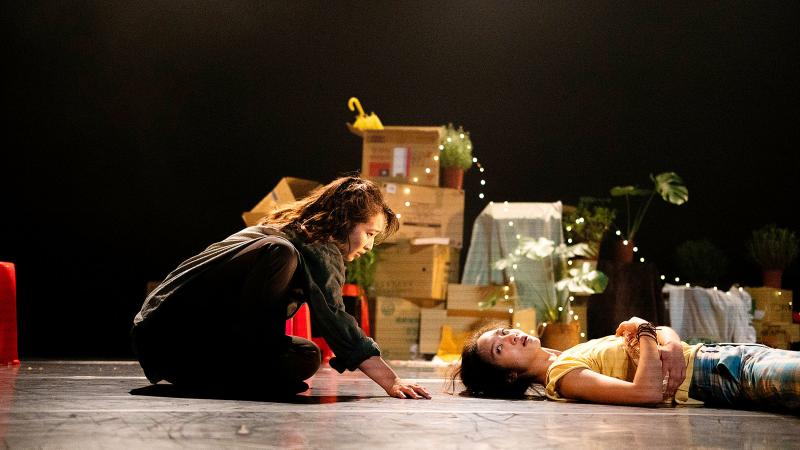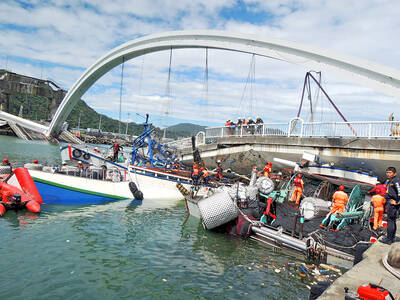A year ago this month, Lai Hung-chung’s (賴翃中) Hung Dance (翃舞製作) produced its first Stray Birds Platform (漂鳥舞蹈平台) at the Taiwan Traditional Theatre Center’s Experimental Theater.
Lai had long wanted to produce such a show to highlight creations by young choreographers working in Taiwan or abroad, as well as display the talents of young Taiwanese dancers, and last year’s two-show production featured eight works, mostly duets and solos, by seven choreographers, including himself.
The works could be new, or ones that have been performed elsewhere, such as choreography or dance festivals.

Photo courtesy of Hung Dance
Lai picked the title “Stray Birds” as a metaphor for Taiwanese dancers and choreographers spreading their wings, flying around the world to perform or compete and then returning home to Taiwan to show what they have learned, much as he has done since founding his company in May 2017.
This year, Lai has both expanded and condensed his vision. The platform has expanded to three shows, with tonight and tomorrow’s performances featuring works by choreographers with a proven track record, but scaled down from seven to four: Lai, Cheng Hao (鄭皓), who has worked with Horse (驫舞劇場) and others; Lin Junyu (林俊余) and Chow Kuan-jou (周寬柔). Sunday features a line-up of seven fledgling creators, including some graduate students at the Taipei National University of Arts, who will by vying for awards.
Tonight and tomorrow’s shows run about 60 minutes, with no intermission. Lin’s piece is entitled A Pillow Song (床邊歌), Cheng’s is Copy for Go Around (兜圈), Chou’s is called The end of the room and Lai titled his duet Hug.

Photo courtesy of Hung Dance
Sunday’s show runs just over 90 minutes, with a 15-minute intermission and an awards ceremony at the end. It features works by Kang Hao-chu (康皓筑) and Lo Pei-tzu (羅珮慈); Liao Chien-yao (廖健堯), Lu Ting (呂莛), Liao Szu-wei (廖思瑋), Yeh Huan-chun (葉喚軍) and Hsu Wei-po (許瑋博).
■ Tonight and tomorrow at 7:30pm, Sunday at 2:30pm
■ Taiwan Traditional Theater Center’s Experimental Theater (臺灣戲曲中心小表演廳), 751, Wenlin Rd, Taipei City (台北市文林路751號)
■ Tickets are NT$800 for tonight and tomorrow; NT$600 for the young choreographers’ showcase on Sunday, available at the National Theater Concert Hall and Eslite ticket desks, online at www.artsticket.com and convenience store ticket kiosks

Before the recall election drowned out other news, CNN last month became the latest in a long line of media organs to report on abuses of migrant workers in Taiwan’s fishing fleet. After a brief flare of interest, the news media moved on. The migrant worker issues, however, did not. CNN’s stinging title, “Taiwan is held up as a bastion of liberal values. But migrant workers report abuse, injury and death in its fishing industry,” was widely quoted, including by the Fisheries Agency in its response. It obviously hurt. The Fisheries Agency was not slow to convey a classic government

Not long into Mistress Dispeller, a quietly jaw-dropping new documentary from director Elizabeth Lo, the film’s eponymous character lays out her thesis for ridding marriages of troublesome extra lovers. “When someone becomes a mistress,” she says, “it’s because they feel they don’t deserve complete love. She’s the one who needs our help the most.” Wang Zhenxi, a mistress dispeller based in north-central China’s Henan province, is one of a growing number of self-styled professionals who earn a living by intervening in people’s marriages — to “dispel” them of intruders. “I was looking for a love story set in China,” says Lo,

It was on his honeymoon in Kuala Lumpur, looking out of his hotel window at the silvery points of the world’s tallest twin skyscrapers, that Frank decided it was time to become taller. He had recently confessed to his new wife how much his height had bothered him since he was a teenager. As a man dedicated to self-improvement, Frank wanted to take action. He picked up the phone, called a clinic in Turkey that specializes in leg lengthening surgery — and made a booking. “I had a lot of second thoughts — at the end of the day, someone’s going

In the next few months tough decisions will need to be made by the Taiwan People’s Party (TPP) and their pan-blue allies in the Chinese Nationalist Party (KMT). It will reveal just how real their alliance is with actual power at stake. Party founder Ko Wen-je (柯文哲) faced these tough questions, which we explored in part one of this series, “Ko Wen-je, the KMT’s prickly ally,” (Aug. 16, page 12). Ko was open to cooperation, but on his terms. He openly fretted about being “swallowed up” by the KMT, and was keenly aware of the experience of the People’s First Party